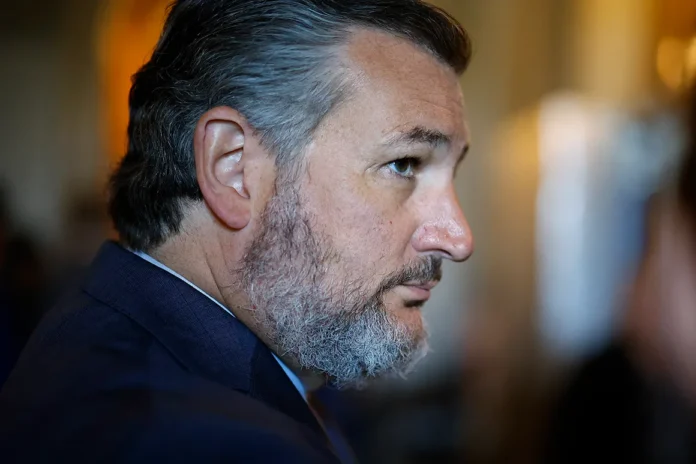Introduction: A Conservative Feud Spills Into the Open
The Republican Party is no stranger to internal clashes, but the latest spat between Senator Ted Cruz of Texas and media personality Tucker Carlson has reignited debates over the moral compass of conservative politics. The controversy began when Carlson made comments suggesting he would be “comfortable offering condolences to Osama bin Laden’s family” and that America’s decision to fight Nazi Germany in World War II was “arguable.”
Cruz, one of the GOP’s most prominent senators and a 2016 presidential contender, wasted little time condemning Carlson’s remarks. On his podcast, Verdict with Ted Cruz, he accused the former Fox News anchor of suffering a “moral collapse” and abandoning conservative principles in favor of provocative, contrarian rhetoric.
The feud, though personal in tone, reflects a much broader struggle over what modern conservatism stands for — and where the movement is heading in an age of populism, polarization, and cultural realignment.
Tucker Carlson: From Conservative Powerhouse to Controversial Outsider
To understand why Cruz’s rebuke matters, one must first examine Carlson’s trajectory in American media.
- Early Career: Carlson began as a print journalist before becoming a cable news commentator. He hosted shows on CNN and MSNBC before finding his ideological footing at Fox News.
- Fox News Stardom: From 2016 until his departure in 2023, Carlson dominated prime time, drawing millions of nightly viewers with his blend of populist conservatism, nationalism, and skepticism of U.S. foreign policy.
- Post-Fox Pivot: Since leaving Fox, Carlson has cultivated a fiercely loyal online following. His interviews with controversial figures — including Vladimir Putin — have cemented his reputation as an iconoclast unafraid to defy mainstream conservative orthodoxy.
Carlson’s transformation has been both admired and criticized. Admirers see him as a truth-teller pushing back against establishment narratives. Critics argue he increasingly flirts with extremism, using shock value to maintain relevance.
It is this latter perception that Cruz tapped into when calling out Carlson’s latest remarks.
The Spark: Bin Laden’s Family and WWII Revisionism
The controversy began when Carlson, during a podcast discussion, made two explosive claims:
- Condolences for bin Laden’s family: Carlson insisted he despised Osama bin Laden but would feel “totally comfortable” offering sympathy to his relatives. Critics saw this as a bizarre form of moral relativism, equating the mastermind of the September 11 attacks with ordinary human tragedy.
- World War II “Arguable” Comment: Carlson also mused that America’s decision to side against Nazi Germany in World War II could have been reconsidered, suggesting that aligning with Hitler against Stalin might have been defensible.
The backlash was swift. While Carlson has often questioned U.S. foreign policy, touching sacred ground like WWII and 9/11 victims crossed a line for many conservatives.
Ted Cruz Responds: A Line in the Sand
Cruz reacted forcefully, framing Carlson’s statements as both morally and politically unacceptable.
“Something is wrong with Tucker Carlson,” Cruz said bluntly. “If he’s not an antisemite, he’s increasingly sounding like one. To suggest condolences for bin Laden’s family or to entertain siding with the Nazis — that’s unrecognizable. That’s not conservative. That’s moral collapse.”
Cruz further argued that Carlson’s rhetoric echoed that of far-left progressive figures such as Ilhan Omar and Rashida Tlaib, both of whom have been criticized for controversial comments regarding U.S. foreign policy and Israel. By making such comparisons, Cruz highlighted what he sees as Carlson’s drift into territory that once defined the ideological opposition.
Conservative Division: Interventionists vs. Isolationists
This feud exposes deeper divisions within conservative thought:
- Interventionist Conservatives (Cruz’s camp): They argue that America has a duty to confront tyranny and terrorism abroad, from the fight against Nazism to the war on terror. They see Carlson’s comments as not only offensive but also historically and strategically dangerous.
- Isolationist Conservatives (Carlson’s camp): They are skeptical of foreign entanglements, view U.S. interventionism as costly and corrupting, and believe elites manipulate wars for their own ends. To them, Carlson’s provocations are meant to spark debate about U.S. foreign policy excesses.
This fault line is not new. From debates over the Iraq War to disagreements about aid to Ukraine, conservatives have long clashed over whether America should lead globally or retreat inward. Cruz’s rebuke of Carlson shows how personal — and public — this divide has become.
Historical Context: Why WWII and bin Laden Are Non-Negotiable
Why did Cruz react so strongly? Because Carlson touched two of the most symbolically untouchable subjects in American political culture:
- World War II: For decades, WWII has been framed as a clear-cut moral battle between democracy and fascism. Suggesting that the U.S. could have sided with Hitler risks legitimizing Nazism, an ideology synonymous with genocide and totalitarianism.
- September 11, 2001: The attacks on the World Trade Center and the Pentagon remain seared into national memory. Extending sympathy toward the mastermind’s family — even if framed as human compassion — was bound to be interpreted as minimizing the horror inflicted on nearly 3,000 Americans.
By invoking both, Carlson effectively challenged two pillars of American collective identity: the moral clarity of WWII and the tragedy of 9/11.
Media and Political Reactions
The Cruz-Carlson clash quickly spread across political media and social platforms.
- Conservative Outlets: Some commentators defended Cruz, saying leaders must draw clear moral lines. Others argued that Carlson’s provocations, while offensive, reflect genuine frustration with America’s foreign policy establishment.
- Progressive Media: Liberal commentators seized on the feud to highlight fractures in conservative politics, framing Carlson as increasingly radical and Cruz as opportunistically seizing a moment to rebrand.
- Social Media: Reactions ranged from outright mockery of Carlson’s comments to concerns about the mainstreaming of extremist rhetoric. Hashtags like #CruzVsCarlson trended briefly on X (formerly Twitter).
Ted Cruz’s Political Strategy
Cruz’s rebuke also carries strategic weight. As speculation grows about the 2026 Senate races and potential 2028 presidential bids, Cruz is keen to position himself as both a principled conservative and a moral voice within the GOP.
By denouncing Carlson:
- He distinguishes himself from populist extremes while still aligning with Republican voters’ patriotism.
- He signals loyalty to traditional conservative values, particularly regarding national security and historical memory.
- He draws a contrast between serious political leadership and provocative media personalities.
In short, Cruz’s stance may appeal to donors, voters, and party leaders seeking stability amid internal rifts.
Tucker Carlson’s Counter-Narrative
Carlson has not apologized or walked back his statements, instead framing them as exercises in free thought. His defenders argue:
- He was not endorsing bin Laden or Hitler, but questioning the narratives Americans are taught.
- His willingness to provoke outrage shows courage in confronting taboos.
- Media and political figures overreact to maintain control over acceptable discourse.
This counter-narrative reinforces Carlson’s brand as a contrarian outsider willing to break with orthodoxy — even if it costs him mainstream conservative allies.
Implications for the Conservative Movement
The Cruz-Carlson feud highlights three key dynamics shaping conservatism today:
- Fragmentation of the Right: The GOP is increasingly divided between nationalist-populists, traditional conservatives, and libertarians. Media figures like Carlson wield as much influence as elected officials, complicating party unity.
- The Power of Media: Carlson’s ability to command attention even outside Fox shows the enduring influence of alternative platforms. Cruz’s need to respond demonstrates how media figures can set the political agenda.
- Moral Boundaries in Politics: The debate raises a larger question: are there rhetorical lines that conservatives — or any political group — must not cross? Cruz insists yes. Carlson suggests otherwise.
Conclusion: A Fight Over the Soul of Conservatism
Ted Cruz’s denunciation of Tucker Carlson marks more than a personal feud. It symbolizes a broader battle for the moral and strategic direction of the conservative movement.
At stake is whether conservatism will remain rooted in historical clarity — the fight against fascism, the condemnation of terrorism — or whether it will embrace a more provocative, contrarian posture that tests the limits of political discourse.
For now, Cruz’s message is clear: sympathy for bin Laden’s family or revisionism about Nazi Germany is not conservatism. It is, in his words, “a moral collapse.”
How Republicans and conservative voters respond may reveal not just the future of Tucker Carlson’s influence, but the very identity of the GOP in an era of ideological flux.




